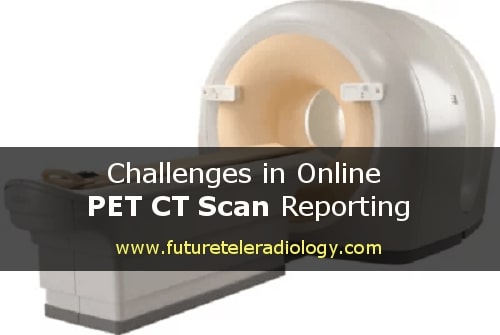PET-CT Scan is an imaging technology that includes screening, diagnosis and monitoring of cancer. It leads to improvement in health care outcomes and survival rates. This technology that can detect accurately complications in cancer patients is heavily under-penetrated in India.
The global World Health Organization standard is 1 PET-CT scanner per 500,000 people. While in India we have we have <200 PET-CTs, mostly concentrated in metro cities.
Nuclear medicine imaging has come a long way in India. It has progressed from rectilinear scanning to hybrid imaging like PET and CT or MR popularly known as PET-CT and PET-MR. PET emerged in the mid-1970s to be used as a research tool in studying cardiology and neurology. But today its largest application is in oncology.
There are some challenges in online PET CT Scan reporting:
1. High cost of PET scanner:
The PET scanner is expensive and so are the rates for reporting. You need specialists for interpreting the report thus, the overall burden of an expensive machine along with the compensation for the sub-specialists is borne by the patient itself. But, online PET-CT scan can be a solution to this challenge. The reports of the patient can be shared online with a teleradiology center where a team of expert radiologists work 24×7 and make the interpretation available at reasonable rates.
2. Lack of awareness:
Awareness regarding the advantages and the utility of PET-CT imaging among health care professionals and patients is comparatively less. As compared to the CT scanners and MR machines the number of PET-CT scanners is less. East Asian countries like Japan, China and Korea have more machines in comparison to India and are far ahead in terms of medical infrastructure. Thus, online PET-CT scan reporting can be a solution to this challenge.
Moreover experts to interpret the PET-CT scan are not readily available when needed. In such circumstances health care professionals can approach online teleradiology centres where they can interpret PET-CT scan reports 24×7.
3. Spread of cancer in India:
Cancer is a major health challenge in India. The International Cancer Agency GLOBCAN has predicted that the population of cancer patients will double in the next 20 years. There will be more than 1.7 million new cases by 2035. Cancer deaths will keep rising in future.
Lack of proper infrastructure to tackle this increasing incidence of cancer in India aggravates this health issue. Cancer treatments call for emergencies where various reports need to be interpreted on urgent basis to begin treatment and care. Online teleradiology centers are equipped to assist health care professionals with immediate interpretation of PET-CT scan to get rid of delays.
4. Advanced health care concentrated in urban areas:
India has unequal distribution of trained medical and technical professionals. Most of the Indian population is concentrated in rural areas out of which some are quite remote. They have limited access to medical experts while people living in urban areas have better access to health care facilities.
Doctors prefer to practice in urban areas due to better opportunities and amenities. Most of the qualified physicians working in imaging companies or teleradiology companies are working in urban areas.
In such a scenario PET-CT scan can be shared with centers in urban areas through teleradiolgy. Diagnosis and interpretation of these reports can be accessed by communicating with teleradiologists in urban areas. Here teleradiology plays a crucial part by engaging resources available in urban areas to cure rural patients who otherwise wouldn’t get access to treatment and care.
5. Political commitment:
Creating an infrastructure for online PET-CT scanning and making it affordable to the poor and remote areas requires political will and commitment at a national level. There should be a professionally dedicated team to monitor the project right from inception to implementation.
Vision backed with an appropriate strategy by anticipating/estimating the future number of cancer patients is vital. Indian government has taken initiatives to engage rural health care centers /professionals to use teleradiology to extend care to the rural population. Uttarakhand has followed Haryana, Assam, Meghalaya and Andhra Pradesh to introduce teleradiology to tide over shortage of doctors / radiologists and ensure timely diagnosis and health care for patients especially in remote areas.
Future Teleradiology Solutions provides high-quality, accurate final and preliminary reads of X-rays/ radiography, PET-CT scan, CT scan and MRI, across the globe throughout the year. Our expert teleradiologists are keen on maintaining quality and promptness of service.
We have radiologists specialized in all radiological subspecialties to handle complex cases. Subspecialty reports are analyzed by experts in various fields- Cardiology, Musculoskeletal disorders, Neuro-radiology, vascular disorders, Oncology, Chest related disorders, and Gastro-Intestinal disorders etc.
Future Teleradiology based in India provides teleradiology services in India and all around the globe. You may be located in cities or rural area or any other country like Bangladesh, Nepal, Singapore, Sri Lanka, Brazil, Ethiopia, Nigeria Ghana, Iraq, Libya, UAE, Oman, Qatar, Yemen, etc. – reach out to us for the best teleradiology services.
